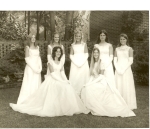BACKGROUND
I was born in 1952 into an affluent, white family in South Carolina. We considered ourselves part of the aristocracy of the state. I attended a private, church-established school that was hastily founded to avoid integration. Much like the character, Scooter, in The Help, I was a debutante and was offered membership in the Colonial Dames and the Junior League. A pair of pastel portraits of African American women holding white babies hung over my bed. I had every advantage of a comfortable life, good education and access to many opportunities. Yet…something was wrong. There were several African American women in my life growing up. My mother, my grandmother and every ancestor since the Revolution were raised by African American women. I was surrounded by black “help” –maids, nurses and cooks. They were an unquestioned part of life. Jesse Mae, Geneva, Clara Mae, Llewellyn, Daisy, Theresa, Luvenia–I didn’t know their last names and rarely saw their children. The talk in the household and community about desegregation and inferiority was bewildering. I wondered why my parents entrusted me to the care of people they thought were inferior and why it would be so terrible to be in school with black children. My fear was that if skin color was a determinant of inferiority, what inferiorities might I harbor that would not be as obvious as skin color but would eventually “out” me.

Felicia,
As one might expect “Just Like Family” promises to be an interesting project and a story that should be told. I’m teaching at Trident Tech but if there is any way I can help you with this film please call on me. Frost
Felicia, I wish I could speak with you. I have recently started researching my family origins and I believe that my grandfather, who was born in Sumter, SC is a descendent of your family members.
Thank you for contacting me. I’d love to speak with you. Please give me more information if you can and maybe I can help trace the story. Your grandfather’s name, birth and death dates, who he was married to. What are some of the stories you heard about him? Did he talk about being on a Furman Plantation? In the meanwhile you may want to check out this blog. Google on BitterSweet Linked Through Slavery. Search on Furman and you’ll see three long posts about the Furman’s connection to Slavery. Felicia Furman. Do you want to try to speak on the telephone?
For some reason my Google page reads: Posts about Nancie Caraway written by Felicia Furman. Any idea why?
This is a mystery. I don’t know what this means. What are you Googling on?
Hi Felicia,
Your blog is fascinating, I am writing a book about African American women included in family portraits with their white employers and portraits of African American women with white children and babies from the mid 19th century to the 1920s. I hope you’ll get in touch with me so we can share some information.
Would love to get in touch. Glad you are doing the book. Very delicate matter but it is part of black and white history. Our shared history like it or not.